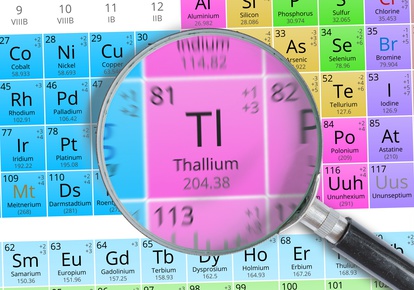Do you have thallium toxicity? Get yourself tested here.
Ever heard of the toxic heavy metal called thallium? Many people have never heard of it, yet thallium toxicity is worse than lead, cadmium and mercury toxicity combined. Once used as rat poison thallium was banned many years ago and has been associated to the loss of the ability to walk. Thallium is therefore considered extremely toxic with a lethal dose for a man only 0.5 – 1 gram. However even smaller doses can cause you serious health problems especially if you are exposed to low levels of the metal over longer periods of time.
Thallium’s major effects are those on the nervous system, skin, cardiovascular system, kidneys, immune system, and many other vital systems. Thallium is still being used today regardless of its toxicity in such industries as optics, medical science, electronics and gas emissions from cement factories. The real question is are you toxic with thallium?
Symptoms of thallium toxicity
Thallium toxicity can affect almost every part of your body because of its highly toxic effects on the nervous system, here are some of these effects in terms of possible symptoms:
- Loss of the use of your legs or partial paralysis of the legs
- Swelling of the feet and legs
- Joint pain
- Hyperesthesia – excessive physical sensitivity, especially of the skin.
- Paresthesia – an abnormal sensation, typically tingling or pricking (‘pins and needles’), caused chiefly by pressure on or damage to peripheral nerves.
- Mental confusion
- Polyneuritis (any disorder that affects the peripheral nerves collectively.), with severe pains in the legs and loins
- Angina-like pains
- Nephritis – inflammation of the kidneys.
- Degenerative diseases
- Muscle wasting
- Eosinophilia – an increase in the number of eosinophils in the blood, occurring in response to some allergens, drugs, and parasites, and in some types of leukaemia.
- Rapid hair loss
- Loss of appetite
- Fatigue
- Severe pain in the calves of the legs
- Albuminuria – the presence of albumin in the urine, typically as a symptom of kidney disease.
- Optic neuritis – inflammation of an optic nerve, causing blurred vision.
The dangers of thallium & potassium deficiency
Thallium even in small doses can severely affect the essential nutrient potassium, thallium knocks potassium out of cells, this not only destroys the body’s ability to use potassium but also causes cell poisoning. Therefore deficiency symptoms of potassium can be signs of thallium toxicity such as:
Potassium deficiency – Rapid irregular heart beat, muscle weakness, pins and needles, irritability, nausea, vomiting, diarrhoea, swollen abdomen, cellulite, low blood pressure resulting from an imbalance of potassium to sodium ratio, confusion and mental apathy.
Potassium is one of the body’s most important electrolytes, essentially the loss of potassium as a result of thallium toxicity will cause an electrolytes imbalance leading to the following symptoms which can be signs of thallium toxicity:
• Eating disorder
• Fatigue
• Muscle pain
• Headache
• Nausea/vomiting
• Bowel irregularities
• Heart problems
• Kidney issues
Thallium toxicity & genetics
Some people are genetically predisposed to thallium toxicity, this is because certain genes belonging to liver detoxification pathways that normally deal with heavy metal detoxification have been deleted, in these cases a genetics test can confirm and a specialized nutritional program can help the individual detoxify thallium.
Do you have thallium toxicity?
The best way to find out if you have toxic levels of thallium and or if you’re at risk from thallium related disease is by a hair mineral analysis, this simple home test shows if you are toxic and guidance can be given to how to detoxify the thallium in your situation as everyone is different.
Those who have problems with the use of their legs and or are confined to a wheelchair should seriously consider testing for thallium.
Detoxification of thallium
Often people attempt to detoxify thallium without knowing if they have toxicity and without knowing the best ways to achieve results. Many heavy metal detoxification supplements on the market do not work and often contain toxic heavy metals themselves.
Thallium is a very toxic metal and each person who has been exposed to the metal is affected in different ways, this can cause detoxification problems.
It’s important to have yourself tested by professionals that can guide you through the detoxification process that will work for you personally. It’s also possible that you may have a gene mutation which can make any basic detoxification program useless and or harmful.
Have any questions about thallium toxicity & treatments? Click here to get an online consultation now.

